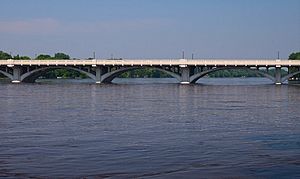Anoka–Champlin Mississippi River Bridge facts for kids
Quick facts for kids Anoka–Champlin Mississippi River Bridge |
|
|---|---|

The bridge from Peninsula Point Two Rivers Historical Park in Anoka
|
|
| Coordinates | 45°11′29.5″N 93°23′43.5″W / 45.191528°N 93.395417°W |
| Lua error in Module:Location_map at line 420: attempt to index field 'wikibase' (a nil value). | |
| Built by | Minneapolis Bridge Company |
| Architect | C.M. Babcock |
| NRHP reference No. | 79001181 |
| Added to NRHP | December 31, 1979 |
| Carries | Four lanes of |
| Crosses | Mississippi River |
| Locale | Anoka and Champlin, Minnesota |
| Maintained by | Minnesota Department of Transportation |
| ID number | 4380 |
| Characteristics | |
| Design | Open spandrel concrete deck arch bridge |
| Total length | 1,038.4 feet (316.5 m) |
| Width | 56 feet (17 m) |
| Longest span | 108 feet (33 m) |
| Clearance below | 19 feet (5.8 m) |
| History | |
| Opened | 1929 |
The Anoka–Champlin Mississippi River Bridge is a cool old bridge that crosses the mighty Mississippi River. It connects the cities of Anoka and Champlin, Minnesota in the United States. People also call it the Ferry Street Bridge.
This bridge is a type called an "open spandrel concrete deck arch bridge". It has 10 sections that stretch across the river. The Minneapolis Bridge Company built it in 1929. It replaced an even older bridge that stood in the same spot since 1884.
In 1979, the bridge was added to the National Register of Historic Places. This means it's an important historical site. It was recognized for its special design and how it helped connect the two towns.
Contents
The First Bridge (1884)
Before the current bridge, there was another one built in 1884. This was the first time a bridge connected Anoka and Champlin over the Mississippi River.
- It had four steel sections.
- The top part, or deck, was made of wood.
- It was about 18 feet (5.5 m) wide.
- One part of the bridge could spin open. This let big steamboats and other boats pass through.
Back then, the wooden deck meant not too many vehicles could cross at once. There was even a rule! If you crossed faster than a brisk walk, you could get a $10 fine. That was a lot of money back then!
Why a New Bridge Was Needed
When cars became popular in the early 1900s, the old bridge wasn't good enough anymore. It was too narrow and not strong enough for new vehicles.
The U.S. War Department also worried about it. They said it was too weak for military vehicles in an emergency. It also slowed down river traffic.
So, in 1926, engineers started planning a new, modern bridge. While they waited for the new one, the Minnesota Highway Department put up signs. These signs said only light vehicles (under six tons) could cross. But even with fines, some drivers still damaged the old bridge with heavy loads.
Building the New Bridge
In the 1920s, concrete became a popular material for building bridges. It was cheaper than stone but still very strong.
How They Built It
The designers of the Anoka–Champlin Bridge used a special arch shape. They also put steel inside the concrete. This made the bridge extra strong. Since concrete doesn't need painting like steel, it was also easier to take care of.
Workers built the concrete arches using something called falsework. This was like a temporary scaffold made of wood. They poured the wet concrete into these wooden forms. This way of building took a lot of time and effort. It was also quite expensive.
Later, in the 1950s, a new method called prestressed concrete girders became popular. This made bridge building faster and easier.
Bridge Updates and History
By 1991, the Anoka–Champlin Bridge needed some major repairs. It had gotten old and worn out.
- Workers built a temporary bridge right next to the old one. This let traffic keep moving.
- They took down parts of the old bridge, leaving only the main piers and arches.
- Then, they built a new, wider deck and support system.
- To keep its historical look, they made sure the new parts, like the decorative concrete railing, looked just like the old ones.
The updated bridge reopened in 1998. After that, the temporary bridge was removed. Today, it continues to carry traffic across the Mississippi River.
 | Lonnie Johnson |
 | Granville Woods |
 | Lewis Howard Latimer |
 | James West |

